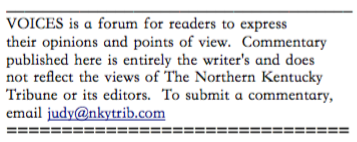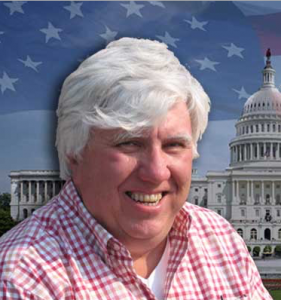WASHINGTON – Kentucky’s elected Republicans are showing why none of their members can expect to be included in any future addendum to John F. Kennedy’s Pulitzer Prize-winning book Profiles in Courage.
With GOP presidential candidate Donald Trump tearing the party asunder with his misogyny, racism and bigotry, the commonwealth’s Republican representatives in Washington can do little but express a little tut-tut, even when it comes to the nominee’s vulgar rap about sexual assault.
None of the seven lawmakers have dared to condemn Trump’s actions, saying only, for the most part, that his words are unacceptable. Those who endorsed his candidacy, including Senate Republican Leader Mitch McConnell, of Louisville, and Sen. Rand Paul, R-Bowling Green, who was shattered by Trump in this year’s Republican presidential primary, continue to do so.
McConnell, in a typical reaction, said Trump’s recent comments about women and sexual assault “are repugnant and unacceptable in any circumstance. As the father of three daughters, I strongly believe that Trump needs to apologize directly to women and girls everywhere, and take full responsibility for the utter lack of respect for women shown in his comments on that tape.”
That and about two-and-a-half bucks will buy you a cup of coffee at Starbucks. Obviously those seeking re-election this year are playing the grand old game of cover your behind, hoping voters will either accept or ignore their weasel words on the subject.

Regardless, Trump’s actions and rhetoric have created a divide within the Republican Party greater than the Grand Canyon, leading some to predict his rolling-off-the-cliff candidacy will somehow result in the party’s demise, ultimately leading to, well, who knows what? Writers ranging from Charles Pierce in Esquire to Chris Cillizza of The Washington Post have broached the issue and a Google search reveals plenty of speculation about the potential downfall.
But the ongoing conjecture fails to grapple with the fact that the GOP has proved rather resilient over the years, even when it seemed to be stepping onto destiny’s doorstep. In 1912, the indefatigable Teddy Roosevelt, having returned to the U.S. after a series of trips and adventures abroad, sought to reclaim the office he held from 1901 to 1909, challenging his hand-picked successor, William Howard Taft, who had proved to be a great disappointment to his sponsor.
Taft won the Republican nomination but TR, unsatisfied with that outcome, staged a third-party run under the Bull Moose banner, fracturing the party along progressive lines, led by Roosevelt, and the entrenched conservative faction linked to Taft.
The result was the election of Democrat Woodrow Wilson, with Taft, the regular Republican, finishing a distant third.
It was feared that Roosevelt had laid waste to the party then but the concern proved relatively brief. Wilson served for eight years but was succeeded by three straight Republican presidents who represented the conservative faction – Warren G. Harding, Calvin Coolidge and Herbert Hoover.
Progressives retained some stature in the party – Nelson Rockefeller, Jacob Javits, Clifford Case – but the right wing ultimately prevailed.
Later, of course, there was our old pal, Dick “I Am Not a Crook’’ Nixon, who brought the party to the brink of despair in 1974 as a result of Watergate, abetted by his successor, Gerald Ford, who was roundly chided for pardoning the old fraud for any potential charges lodged as a result of the caper.
Ford himself only rose to the high position as a replacement for Vice President Spiro Agnew, who was forced to resign for taking a bribe.
Democrat Jimmy Carter bested Ford in the 1976 election and the Democrat held the White House for a scant four years, turning it over to the GOP messiah, Ronald Reagan, in 1980, resulting in 12 straight years of Republican rule.
So the Republican Party has been knock, knock knocking on heaven’s door before and somehow managed to pull out of the dive before reaching terra firma. As Michael Corleone said of Hyman Roth in Godfather II, “He’s has been dying from the same heart attack for the last twenty years.’’
And the guessing game over the Republican Party’s future ignores the numbers. Like it or not, the GOP still controls the House and Senate, and likely will maintain the lower chamber after Nov. 8 even though the Senate appears up for grabs.
More importantly, however, are the states. Republicans control the governorship, the state Senate and the state House in 23 states while Democrats hit the trifecta in only seven. The remainder are split, although, as of Oct. 1, Republicans account for 55.1 percent of the 1,972 elected state senators across the fruited plain, 56 percent of the 5,411 state representatives and 56.3 percent of the governorships.
Not exactly a sign of a party on the ropes. The ability to maintain state house control — Republicans are more apt to head to the polls on off year elections — provides the GOP with the power to control redistricting every 10 years following the Census, thus placing a thumb on the scales when it comes to congressional elections. Until Democrats learn their lesson on that score, Republicans will continue to have an outsized say on the national scene.
That’s not to say the Republican Party doesn’t face what we might politely be termed challenges farther up the road, perhaps giving Democrats an opportunity to join Bobby “Blue’’ Bland in singing “Someone gonna hurt you like you hurt me.’’ It’s well established that America will be a majority minority country by about 2040 and the GOP, for all its successes, hasn’t exactly been a juggernaut in attracting Latino, African-American and Asian voters.
In fact it sometimes feels like they’ve assumed the persona of a noted Democrat, Andy Jackson, who repelled the advancing British troops in the Battle of New Orleans, sending them running through the briars and the brambles, as legend goes.
A Trump debacle, which is certainly possible, could once again force the Republican Party to reassess its minority outreach. Maybe it will take this time
The Republican Party, as a matter of act, in an analysis after the 2012 election, which saw President Obama defeat Mitt Romney by about 5 million votes, acknowledged the GOP could be cruisin’ for a bruisin’ if it didn’t step up its game and attract minorities. Unfortunately for the party, Trump, the standard bearer, never reads anything beyond the bottom line of his own semi-successful companies, leaving him unaware of the party’s approaching straits.
Since capturing the nomination, and even before, Trump has intentionally insulted women, blacks, Muslims and Latinos. The only group he hasn’t hit thus far with fewer than four weeks to go before Election Day are white males, who comprise his vociferous and often profane base.
White voters made up 88 percent of the electorate in 1980. If Trump were running 36 years ago, he would win handily. But Pew Research estimates that the percent of the electorate that will be white in 2016 will be under 70 percent for the first time. So getting 65 percent of the white guy vote probably isn’t going to hack it, especially since white women with college degrees are abandoning ship at an alarming rate.
Since passage of the Civil Rights Act of 1964, African Americans have voted for Democratic candidates about 88 percent of the time – including the 95 percent who cast ballots for Obama. Meanwhile, over the past 10 years or so, Latinos have likewise embraced Democrats — 60 percent supported Democrats in the 2010 congressional elections during a big Republican year. Asian Americans also vote predominantly Democrat but to a lesser degree.
That’s why, ultimately, Trumpism is headed for the rocks and the entrenched Republican establishment, as represented by House Speaker Paul Ryan, R-WI, will prevail and maybe even thrive.
Just because Latinos, as an example, are currently voting Democrat doesn’t mean they will follow suit 20 years hence. During the 27 years of mass immigration to the U.S. ending in 1917, Italian-American voters overwhelmingly favored Democrats, playing an important role in the coalition that led to the election of Franklin Delano Roosevelt beginning in 1932.
That continued through the 1960s. But as Italian-Americans became more assimilated and Democrats paid greater heed to the needs of racial minorities, the tide began to turn. Beginning in the 1980s, thanks in some measure to Reaganism, Italians began joining most white Americans in voting Republican.
A Trump debacle, which is certainly possible, could once again force the Republican Party to reassess its minority outreach. Maybe it will take this time.
Washington correspondent Bill Straub served 11 years as the Frankfort Bureau chief for The Kentucky Post. He also is the former White House/political correspondent for Scripps Howard News Service. A member of the Kentucky Journalism Hall of Fame, he currently resides in Silver Spring, Maryland, and writes frequently about the federal government and politics. Email him at williamgstraub@gmail.com.



















The Chamber of Commerce Republicans will probably ask themselves: “how do we rid ourselves of these teaparty kooks”. I didn’t know anybody else in the white community remembered or appreciated Bobby “Blue” Bland. I suspect the younger staff member who has to read and approve these comments will say “Who?”.